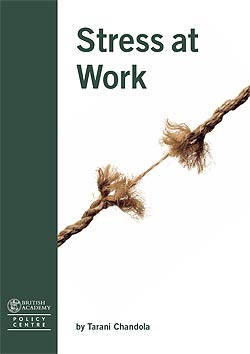 |
 |
|
The British Academy, the UK’s national body for the humanities and social sciences has recently published a report on work-related stress, identifying key facts around increasing stress levels and the need for action by employers, government and the HSE. As an organisation, their purpose is to inspire, recognise and support excellence in the humanities and social sciences, throughout the UK and internationally, and to champion their role and value.
Dave Joyce, CWU's National Health, Safety & Environment Officer begins in the LTB: "This important Report details the fact that at over recent decades there has been rising concern in many countries about the growth and consequences of work stress. It plots European developments where by from the 1980s Scandinavian countries introduced major policy interventions to reduce psycho-social risks at work and from the late 1990s the issue became increasingly central to the agenda of the European Union." Dave gives the background to the report: " In 2004 the European social partners signed a framework agreement to encourage stronger monitoring of stress levels and improvements in work organisation to reduce stress risks. In a number of countries this led to national agreements between employers and unions, to more detailed industry-level negotiations in Denmark, the Netherlands and Sweden and in some cases to changes in labour law. In France, all companies with more than 1,000 employees have been obliged to start negotiations on how to reduce work stress. Such developments, however, have been notably absent in the UK." The LTB then goes into further detail and discusses the key elements of the report and then advises of the conclusion: "The 2008–09 recession has already resulted in increased levels of psychosocial work stressors in Britain. There has been an increase in job insecurity, work intensity and inter-personal conflict at work. Job insecurity among public sector workers has doubled since 2009. Public sector workers also report a greater increase in (and higher levels of) work intensity, inter-personal work conflict, bullying by managers and work hours compared to private sector workers since 2009. With cuts in government spending in the Emergency Budget 2010 directly affecting public sector employment, levels of work stress could increase even more among public sector workers. Any estimated cost savings from budget cuts arising from the recession need to be balanced against the economic costs of work stress." Dave adds: "The economic costs of work stress to society have been estimated to lie between 0.5% and 1.2% of UK GDP. The costs to employers are much smaller than the costs to individuals and to society. The cost of sick pay is the main and primary cost to employers of work-related ill health. However, during recessions, sickness absence may fall and presenteeism could increase despite an increase in work stress. So while there may be significant savings to employers in the short term due to reduced costs of sick pay, the costs to the individual and society are likely to increase if presenteeism increases and employees develop long-term health problems." Concluding, Dave writes: "Work stress has increased since the last recession. The burden of the recession on work stress will not only fall on current workers, but will also be experienced by future workers unless appropriate actions to measure, monitor and mitigate against work stress are introduced." The full LTB goes into further details of the report. You can download the full LTB491/11 here Whilst a copy of the 23 page report entitled " Stress At Work" is attached to the LTB and is also available to download from the E-Library Database using search term 'stress'. Source: CWU |
